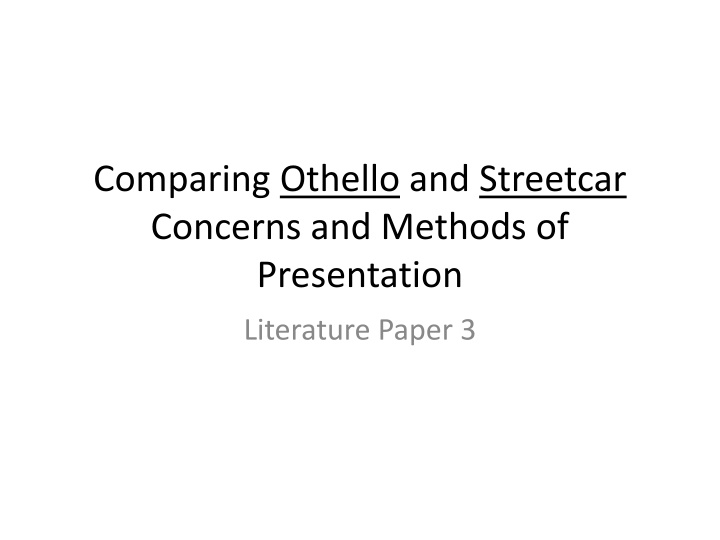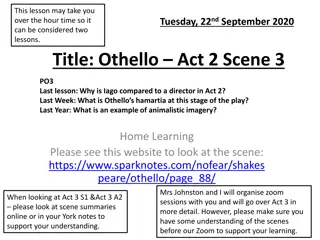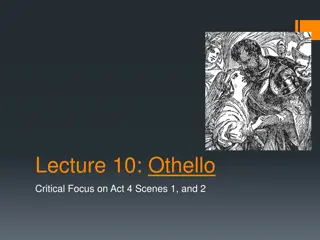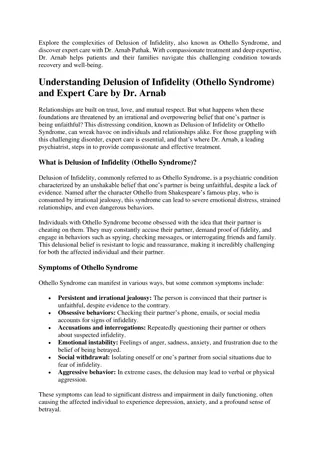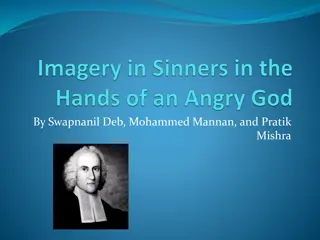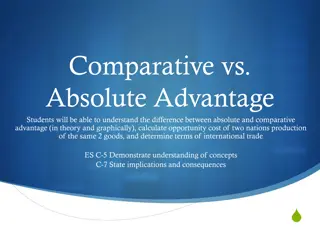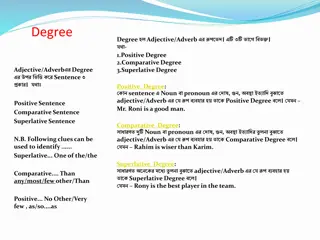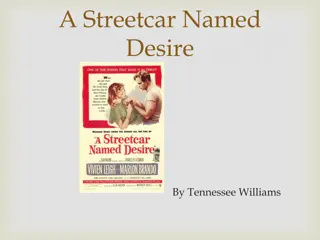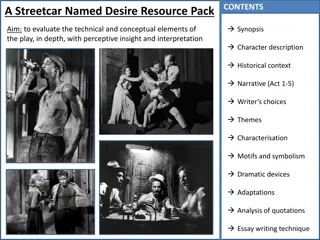A Comparative Analysis of Controllers and Followers in "Othello" and "A Streetcar Named Desire
The paper explores the dynamics of control and submission in "Othello" and "A Streetcar Named Desire," focusing on the characters' roles as controllers, followers, masters, and slaves. It delves into the methods of gaining control, such as through authority, language mastery, and sexual seduction, highlighting the contrasting approaches used by characters like Othello and Stanley. The study also examines the concealment of intentions by characters like Iago and the depiction of voices in public and private spheres in the two plays.
Download Presentation

Please find below an Image/Link to download the presentation.
The content on the website is provided AS IS for your information and personal use only. It may not be sold, licensed, or shared on other websites without obtaining consent from the author.If you encounter any issues during the download, it is possible that the publisher has removed the file from their server.
You are allowed to download the files provided on this website for personal or commercial use, subject to the condition that they are used lawfully. All files are the property of their respective owners.
The content on the website is provided AS IS for your information and personal use only. It may not be sold, licensed, or shared on other websites without obtaining consent from the author.
E N D
Presentation Transcript
Comparing Othello and Streetcar Concerns and Methods of Presentation Literature Paper 3
A Sense of the Genre of Drama Reading a Play Studying Drama Responding Writing an essay of Literary Criticism about Drama; What you read on the pages of a Play? How all this looks and sounds in performance on the stage before a audience; Genre Awareness: Showing awareness of how are you introduced to characters in a play, as against a novel?
Anchor Question Society divides into controllers and the controlled. Compare two texts you have studied in the light of this statement. ~~~~~~~~~~~~~~~~~~~~~~~~~~~~~~~~~~~~~ Comparing (similarities and differences) Thesis: overarching, synthesizing perspective; Concerns; Methods; Effects
Controllers and Followers; Masters and Slaves; the Strong and the Weak Controllers / Masters / Dominators / Silencers Open Transparent Controllers; Principled like Othello, and Unprincipled Stanley; and the Hidden, more devious, subtle manipulative Controllers Submissives - Followers / Servants out of weakness, or they are Lackeys - obsequious knee-crooking knaves Loyalists / the faithful follower out of genuine love, regard, respect Pretenders pretending to follow and serve; shows of service
How to gain Control - Methods / Modes of Control Authority Keep up your bright swords, for the dew will rust them. But nevermore be officer of mine. Force / Violence or the threat of such: Zounds, if I stir, or do but lift this arm, the best of you / Shall sink in my rebuke. Mastery through mastery of Language: Tis in ourselves that we are thus or thus; Our bodies are our gardens, to the which our wills are our gardeners Sexual seduction / Charm offensives - I was fishing for a compliment, Stanley.
Iago conceals his character Iago: I follow him to serve my turn upon him. We cannot all be masters, nor all masters Cannot be truly followed. You shall mark Many a duteous and knee-crooking knave That doting on his own obsequious bondage Wears out his time, much like his master s ass, In following him, I follow but myself. I am not what I am.
Voices of Men and Women in The Public and Private Sphere I want to start very near the beginning of Western literature, and its first recorded example of a man telling a woman to shut up; telling her that her voice was not to be heard in public. (At the start of Homer s Odyssey) Telemachus addresses his mother: Mother, go back up into your quarters and take up your own work, the loom and the distaff speech will be the business of men, all men, and of me most of all; for mine in the power in this household.
The deep-voiced man with connotations of profundity that the simple word deep brings. We find repeated stress throughout ancient literature on the authority of the deep male voice. A low-pitched voice indicated manly courage, a high-pitched voice female cowardice. The tone and timbre of women s speech always threatened to subvert not just the voice of the male narrator, but also the social and political stability, the health, of the whole state. From The Public Voice of Women by Mary Beard
Dramatis Personae - Cast of Characters Comparison of Characters: Social Class and Dramatic Role Othello the Moor of Venice DUKE OF VENICE Brabantio, a Senator, father of Desdemona Gratiano, brother of Brabantio Lodovico kinsman of Brabantio Montano, former Governor of Cyprus Othello, a Moor, Military General, in the service of Venice Cassio, his Lieutenant Iago, Othello s Ancient (Ensign) Desdemona, daughter of Brabantio, wife of Othello Roderigo, a gentleman of Venice Emilia, wife of Iago Bianca, mistress of Cassio A Streetcar Named Desire Blanche DuBois Stanley Kowalski Stella Kowalski Mitch (Harold Mitchell) Eunice and Steve Hubbel Pablo Gonzales A Negro Woman A Doctor; a Nurse A Young Collector A Mexican Woman A Tamale Vendor
Society Comparison of Settings Othello Venice, in Act 1 Streetcar Poor French Quarter of New Orleans; Juxtaposed with Cyprus from Act 2 to Act 5 Juxtaposed with Belle Reve and the Old Plantation South Juxtapositions with other significant Settings Paris Juxtapositions with other significant Settings Mauritania, Africa Ottoman Turkey
Both plays - a Domestic Tragedy; Controllers and Controlled in Marriage Othello Tragic Action - Domestic Setting Othello-Desdemona marital relationship Iago strives and succeeds in destroying the Moor s marriage; and the Moor himself Parallelism and Antithesis Iago-Emilia marital relationship Streetcar Tragic Action - Domestic Setting Stanley-Stella marital relationship Blanche - attempts to destroy Stanley s marriage with Stella; Stanley - in turn, strives and succeeds in destroying Blanche s sibling relationship with Stella; and Blanche herself Parallelism and Antithesis Steve-Eunice marital relationship Dramatic Role of Cassio; Dramatic role of Mitch
[By the way en passant] Framing Devices - Streetcar? And so it was I entered the broken world To trace the visionary company of love, its voice An instant in the wind [I know not whither hurled] But not for long to hold each desperate choice. - from The Broken Tower by Hart Crane Note This epigraph sums up the world of the play It s a broken world; and the elusive search of Blanche for love;
Staging Directions What stage props (properties objects used on stage) would you need for staging the opening Scene of - Shakespeare s Othello the Moor of Venice? Williams A Streetcar Named Desire?
Williams Staging Directions Opening Scene of Streetcar p3 The exterior of a two-storey corner building on a street in New Orleans, named Elysian Fields The section is poor; has a raffish charm. Atmosphere of decay; The music of Negro entertainers at a bar-room around the corner. In this part of New Orleans you are practically always just around the corner, or a few doors down the street, from a tinny piano being played with the infatuated fluency of brown fingers. This Blue Piano expresses the spirit of the life which goes on here.
Visual and Sound Experience; Theatrical Effects on the Audience Visual Techniques (as Directed by the Playwright) Stage Set Design to convey a visual sense of the poorness and ramshackle appearance of this section of New Orleans The close proximity of the dwelling places; The brown river and railroad tracks; Sound Devices The sound of the Blue Piano The noisy low life chatter of low life characters on this low life street in this section of New Orleans
Exploiting Notes from the Text p91 Williams Stage Directions are extremely detailed; almost cinematic in scope; The French Quarter of New Orleans (the Setting of the play) to look poor and run down; Yet Williams manages to invest it with considerable beauty and poetry. The atmospheric jazz piano, a strong leitmotif in the play; The river and the L&N railroad tracks (Louisiana and Nashville) symbolically suggestive of transportation of mechanization, materialism, commerce, a world only briefly glimpsed at, in what is primarily a domestic play;
Hellenic Allusion to Elysium Elysian Fields, symbolically considered an appropriate name for the street; Why? Classical allusion to Elysium (the Elysium Fields) the resting place for the blessed in ancient Greek mythology; a place of ideal happiness; Irony? A heaven that Blanche DuBois will be denied - when she comes to stay with the Kowalskis; What major and central theme - is surfaced at this point in Scene 1?
Death in Venice and New Orleans From the opening Scene - Death is a prominent theme in the play A Streetcar Named Desire. How is this theme further developed? What of the play Othello, comparatively considered, with regard to this theme?
Begins with an Ongoing Conversation as a Dramatic Device Negro Woman: [to Eunice]: . . . she says St. Barnabas would send his dog to lick her and when he did she d feel an icy cold wave all up an down her. Well, that night when We enter the play through an ongoing conversation, between the Negro Woman and Eunice, a neigbour of the Kowalskis; Williams thus immediately establishes the licentious atmosphere of this poor section of New Orleans; NOTE: St Barnabas converted from Judaism to Christianity Williams image is therefore an irreverent coupling of Sex and Religion; Do we see an irreverent coupling of Sex and Religion in Othello?
Staging Directions for Stanleys first Encounter with Blanche - Scene 1 Stanley throws the screen door open and comes in. Strongly, compactly built. Since earliest manhood the centre of his life has been pleasure with women, the giving and taking of it, not with weak indulgence, dependently, but with the power and pride of a richly feathered bird among hens. Branching out from this complete and satisfying centre are all the auxiliary channels of his life, such as his heartiness with men, his appreciation of rough humour, his love of good drink and food and games He sizes women up at a glance, with sexual classifications, crude images flashing into his mind and determining the way he smiles at them. Stanley to Blanche: Where you from, Blanche? In Laurel, huh? Oh, yeah. Yeah, in Laurel, that s right. Not in my territory.
Othello from Page to Stage? Also begins in Mid-Conversation As an audience in the theatre, what would be our visual experience of the beginning of Othello as stage directed by Shakespeare? What dramatic techniques are used to convey this theatrical / dramatic experience? Dramatic / Theatrical Effects on the Audience?
Opening Scene of Othello Staging Directions Venice. A street. Enter IAGO and RODERIGO ~~~~~~~~~~~~~~~~~~~~~~~~~~~~~~~~~~ Other Staging Directions? How are they communicated to facilitate the manner in which the play is to be performed, as intended by the playwright?
Scene Painting in Shakespeares Othello? Techniques Stage Setting - a street in the city state of Venice; Lighting opening Scene - in darkness; Directions for Costuming - In personal suit to make me his lieutenant Any Sound / Audial Devices? How is Iago to speak and move; gestures? What might he be thinking? How might he be feeling at this point? How are these staging directions given?
Methods of presenting Character in Othello and Streetcar Soliloquy in Othello Long speech addressed by a character alone on stage directly to the audience to vocalize and reveal states of mind, and point of view; However, a soliloquy may be partly intended to be directed to the audience; partly to the character himself; partly to someone else Consider in this regard Othello s speech 5.1 It is the cause... Let me not name it to you Monologue in Streetcar Monologue long speech by an actor on stage, or as if alone on stage that monopolises a conversation, or prevents others from taking part in the conversation ; In dramatic terms, this device enables Blanche to externalize her private thoughts and pent up emotions; also to vocalise conversations she has had with herself notably Sc 12
Dramatic Techniques Soliloquies and Monologues Soliloquies of Othello Monologues of Blanche Monologues of Blanche notably Sc 1 p12, 13 Sc 4 p40, 41 Sc 6 p56 Sc 10 p78 Sc 11 p85 Othello s first soliloquy? Critical significance in relation to plot progression? Juxtaposed with Soliloquies of Iago Iago s first soliloquy?
Characters Language and Social Class; Language as a Mechanism of Control Othello Verse (Blank Verse) Directed to use elevated, heightened poetic language Blank Verse; signals authoritative public speech; Streetcar Prose (Naturalistic) Use of formal, educated more naturalistic language; Juxtaposed with Use of voice and accent of Southern American working class slang Juxtaposed with Use of Prose Note use of Rhythm; very strong prose
Language - Streetcar - Scene 4 Here - Blanche is addressing her sister Stella - trying to persuade her that her husband, Stanley, is totally wrong for her; that she should leave him; Streetcar as a play is drenched in the past, which we see through Blanche s eyes her point of view; Later, we as an audience, come to doubt her veracity; Blanche cannot come to terms with the present, represented by Stanley, and the social and economic reality by which he lives; and to which she has come to seek refuge; Eventually, Blanche is destroyed Why? She cannot face up to and cope with the real world;
Blanche striving to gain control of Stellas mind - How? Through the Rhetorical use of Language Blanche: Well if you ll forgive me he s common. Stella: Why, yes, I suppose he is. Blanche: Suppose! You can t have forgotten that much of our bringing up, Stella, that you just suppose that any part of a gentleman s in his nature! Not one particle, no! Oh, if he was just ordinary! Just plain but good and wholesome, but no. There s something downright bestial about him! You re hating me saying this, aren t you?
Gaining Control through the Rhetorical Power of Words - Iago [3.3] I am glad of this: for now I shall have reason To show the love and duty that I bear you With a franker spirit. Therefore, as I am bound, Receive it from me. I speak not yet of proof. Look to your wife; observe her well with Cassio. Wear your eye thus: not jealous, nor secure. I would not have your free and noble nature, Out of self-bounty, be abused. Look to t. I know our country disposition well: In Venice they do let God see the pranks They dare not show their husbands; their best conscience Is not to leave t undone, but keep it unknown.
Effects of Iagos Rhetorical Language - Othello s first Soliloquy 3.3 This fellow s of exceeding honesty, And knows all qualities, with a learned spirit, Of human dealings. If I do prove her haggard, Though that her jesses were my dear heart-strings, I d whistle her off, and let her down the wind To prey at fortune. Haply for I am black, And have not those soft parts of conversation That chamberers have; or for I am declined Into a vale of years yet that s not much She s gone: I am abused, and my relief Must be to loath her. O curse of marriage, That we can call these delicate creatures ours And not their appetites! I had rather be a toad And live upon the vapour of a dungeon Than a keep a corner in the thing I love For others uses.
Control through physical force 4.1 Ludovico arrives from Venice with a letter from the Duke Desdemona: A most unhappy one. I would do much / T atone them, for the love I bear to Cassio. Othello: Fire and brimstone! Desdemona: My lord? Othello: Are you wise? Desdemona: Why, sweet Othello - (a charm offensive) [Strikes her] Devil! Desdemona: I have not deserved this.
Iago-Emilia relationship [3.3] Juxtaposed with Othello Desdemona Emilia: I am glad I have found this napkin. This was her first remembrance of the Moor. Iago: How now, what do you here alone? Emilia: Do not chide; I have a thing for you. Iago: A thing for me? It is a common thing Emilia: Ha? Iago: To have a foolish wife. Emilia: O, is that all? What will you give me now For that same handkerchief? Iago: A good wench; give it to me. Emilia: What will you do with t? Iago: [Snatching it] Why, what is it to you?
Control through the use of Physical Force - Streetcar - Scene 3 Stella: Drunk drunk animal thing, you! Blanche [wildly]: Stella, watch out, he s Men [feebly]: Take it easy, Stanley. Easy fellow Let s all Stella: You lay your hands on me and I ll She backs out of sight. He advances and disappears. There is the sound of a blow. STELLA cries out. Blanche: [shrilly] My sister is going to have a baby! Mitch: This is terrible.
Control: Physical Force - the Hubbel Apartment - Scene 5 p42 - Parallelism Eunice: I heard about you and that blonde! Steve: That s a damn lie! Eunice [shrieking]: I m gonna call the police! A clatter of aluminium striking a wall is heard, followed by a man s angry roar, shouts and overturned furniture. There is a crash; then a relative hush. Eunice appears on the steps in daemonic disorder. NOTE: Later on, in Scene 11 Eunice remarks to Stanley I always did say that men are callous things with no feelings
Control through the Fury of Words 4.2 Desdemona: I understand a fury in your words. Othello: Are you not a strumpet? Desdemona: No, as I am a Christian. Othello: What, not a whore? I took you for that cunning whore of Venice That married with Othello. [Raises his voice] You, mistress, / That have the opposite to St Peter, / And keep the gate of hell -
Control through the Fury of Words and Physical Violence - Streetcar Scene 8 Stanley: That s how I ll clear the table! [He seizes her arm.] Don t ever talk that way to me! Pig Polack disgusting vulgar greasy! them kind of words have been on your tongue and your sister s too much around here! What do you think you are? A pair of queens? Remember what Huey Long said Every Man is a King! And I am the king around here, so don t forget it! [He hurls a cup and saucer to the floor.] My place is cleared!
Incarceration and Execution Ultimate Forms of Social Control Streetcar Institutions of Social Control the Lunatic Asylum Agents of institutionalized state control the doctor and the matron Othello Appeals to Religiously inspired Institutionalized Execution an agent of divine justice - for sexually out-of-control women - Yet she must die, else she ll betray more men. [5.2] sacrificing her for an ideal rather than murdering in vengeful hatred;
